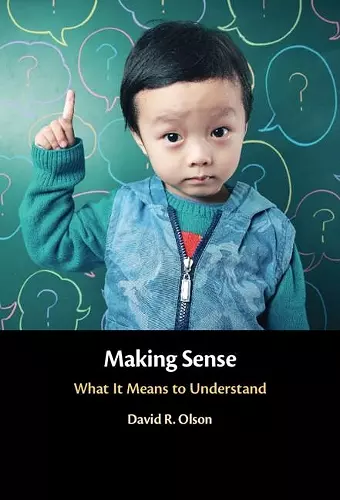Making Sense
What It Means to Understand
Format:Hardback
Publisher:Cambridge University Press
Published:5th May '22
Currently unavailable, and unfortunately no date known when it will be back
This hardback is available in another edition too:
- Paperback£22.99was £22.99(9781009073523)

This account of children's learning to ascribe understanding to themselves and others may help to explain children's theory of mind.
Drawing together developmental and philosophical theories of mind, this book argues that understanding is little more than the ability to ascribe understanding to oneself, a development that depends critically on acquiring the linguistic concept of understanding. This account of understanding provides a model for mental states more generally.Understanding, as Descartes, Locke and Kant all insisted, is the primary 'faculty' of the mind; yet our modern sciences have been slow to advance a clear and testable account of what it means to understand, of children's acquisition of this concept and, in particular, how children come to ascribe understanding to themselves and others. By drawing together developmental and philosophical theories, this book provides a systematic account of children's concept of understanding and places understanding at the heart of children's 'theory of mind'. Children's subjective awareness of their own minds, of what they think, depends on learning a language for ascribing mental states to themselves and others. This book will appeal to researchers in developmental psychology, cognitive science, education and philosophy who are interested in the cognitive and emotional development of children and in the more basic question of what it means to have a mind.
'When David R. Olson asked his apparently pre-verbal 1-year-old to get her shoes, she promptly complied - much to his surprise. That incident planted the seed for a deep enquiry. Had she truly understood him? What does it mean to ascribe understanding to such a young child? We also need to consider who is doing the ascribing. Are young children able to ascribe understanding to themselves? And what about animals and computers? Drawing on the contributions of philosophers, linguists, and psychologists, David R. Olson proposes that understanding is a uniquely human capacity, slowly acquired as part of a web of language practices. His book is a provocative and original contribution to the study of children's theory of mind.' Paul Lansley Harris, Harvard Graduate School of Education, USA
ISBN: 9781316513330
Dimensions: 235mm x 157mm x 14mm
Weight: 450g
210 pages